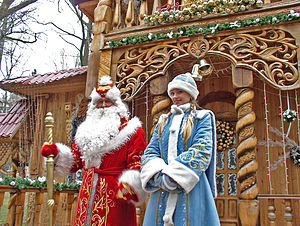Novy God
This article needs additional citations for verification. (December 2009) |


Novy God (Russian: Новый Год) is the Russian phrase for "New Year", and also designates the Russian New Year's Eve and New Year's Day celebration.
Similar customs are observed in all post-Soviet states, and though the observance of the holiday is criticized by conservative Muslim groups in Central Asia,[1] and nationalists in Ukraine,[2] it remains popular across the region.
Russia
The coming of the new year and the actual beginning of the celebration is marked by the Kremlin Clock striking twelve, i.e. midnight Moscow Time[3] preceded by the New Year Address by President of Russia and followed by the playing of the National Anthem of Russia.
Russians generally take the week between New Year and Christmas (celebrated on 7 January, corresponding to Christmas Day according to the Julian Calendar) off (Новогодние каникулы "New Year's holidays").
History
Russia used 1 September as the start of each new year from 1492 until a December 1699 decree of Tsar Peter I mandated the adoption of the Christian Era in 1700. According to this decree, the Russians had to decorate their houses with a fir tree, as it was done by the Germans. But Slavs correlated the fir tree with funeral rites. That is why it took much time for people to accept new customs.[4]
The day first gained some official Soviet sanction after Pravda published a letter from the Kiev functionary Pavel Postyshev on 28 December 1935.[5][3][6] Later (in 1947) it became accepted as a holiday; from 1930 till 1947 it remained just a regular working day,[7] but later it became a non-working day; in the early 1990s it was considered[by whom?] as the only acceptable public non-communist celebration.
According to tradition, Grandfather Frost brings presents for children to put under the tree or to distribute them directly to the children on New Year's morning performances (which are usually held in palaces of culture, theaters, etc.) with the help of his granddaughter Snegurochka (Russian: Снегурочка, generally translated as "the Snow Maiden").
In other countries
Novy God is also a major holiday in other countries of the former Soviet Union, marked by a massively produced Novogodni Ogonek (New Year's Party, literally: New Year's light): a televised celebration that includes performances from favorite pop singers and professional dance troupes, not unlike the Oscars or the MTV VMAs, with famous personalities and celebrities as presenters. It remains popular in many countries that formerly formed part of the now-defunct Soviet Union and in Soviet/Russian emigrant communities worldwide.
Israel
In Israel, the holiday is referred to by the Russian name "Novy God" (נובי גוד) and differs from New Year's Eve, which is considered a Christian celebration (as Israel officially only recognizes the Jewish New Year). Since the celebration is nonreligious, it is celebrated by many Israeli Jews who are first- or second-generation Russian immigrants. Novy God celebrations and merchandise are common[8][9][10] wherever there are large populations of USSR emigrants (e.g. Ashdod, Ashqelon, Beersheba, Netanya,[11] and Haifa[12]).
New Year's Eve celebrations that are associated with Christianity are referred to as Sylvester, after Pope Sylvester I, who died on December 31.[13] Since January 1st is considered the Christian New Year, those who celebrate Novy God are sometimes seen as out of line with the national Jewish identity despite the event's lack of religious affiliation: amongst ultra-orthodox groups, anti-Novy God flyers and chain letters[14] are common, and in 2004 a bill that would ban the presentation of Christmas iconography (reminiscent of the trappings of Novy God) in schools has been presented to the Knesset,[15] where it was rejected.
Some customs have been adapted for Israeli environs, like the use of palm trees for the New Year tree and starting celebrations using the Moscow time zone.[3]
It is common to allow soldiers of Russian-speaking heritage serving in noncombat facilities to go on leave on the night of the 31st to allow them to celebrate the holiday; however, this is not enforced by official order,[16] as it is sometimes seen as an example of discrimination (as with the custom of allowing Ethiopian soldiers vacation time to celebrate Sigd).
See also
References
- ^ "Central Asians Stand By 'Un-Islamic' New Year's Traditions". RadioFreeEurope/RadioLiberty. Retrieved 12 June 2017.
- ^ "No Ukrainian should have a Soviet-style New Year's tree". Euromaidan Press. 26 December 2016. Retrieved 12 June 2017.
- ^ a b c Igor Ebadusin - celebrations of Novy God within ex-USSR immigrants
- ^ History of the New Year Celebration in Russia-from the XVIII century to the present day.
- ^ Karen Petrone, Life Has Become More Joyous, Comrades: Celebrations in the Time of Stalin, Indiana University Press, 2000, ISBN 0-253-33768-2, Google Print, p.85
- ^ Memoirs of Nikita Khrushchev
- ^ ru:Новый год в России
- ^ http://laurencejarvikonline.blogspot.com/2005/12/israel-celebrates-hannukah-and-novi.html
- ^ celebration in HaNoar HaOved VeHaLomed The Federation of Working and Studying Youth
- ^ [1]
- ^ request by Netanya's citizens that the city hall will fund the celebrations
- ^ A member of the Haifa municipal council has suggested that the city's annual `Holiday of Holidays' festival - which combines Hanukkah, Ramadan and Christmas - include Novy God, the Russian secular New Year holiday
- ^ The Russians ain't celebrating [Silvester][2]
- ^ Anti-Novy God chain letter (Hebrew)
- ^ http://www.ynet.co.il/articles/0,7340,L-2858114,00.html Article on anti-New Year's bill (Hebrew)
- ^ military police tested soldiers for alcohol consumption
External links
- Novy God (song) on YouTube
 Media related to New Year in Azerbaijan at Wikimedia Commons
Media related to New Year in Azerbaijan at Wikimedia Commons Media related to New Year in Russia at Wikimedia Commons
Media related to New Year in Russia at Wikimedia Commons Media related to New Year in Ukraine at Wikimedia Commons
Media related to New Year in Ukraine at Wikimedia Commons
